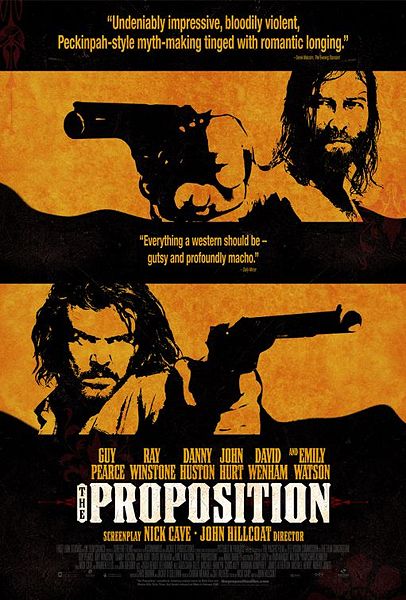
There's a point in the movie when Samuel asks Arthur what a misanthrope is. "Is that what we are?" he asks. "Good lord, no," says the brutal, savage, monstrous killer Arthur Burns. "We're a family." It's not terribly subtle, but there's a reason this story can get away with that kind of handholding; there's a reason we are made to see so plainly the contrast between the bandits with the poets' souls and the more cold-hearted citizenry (and especially Eden Fletcher and the British soldiers under Stanley's command). We get it, the civilizers are uncivilized and the rogues are the ones quoting poetry and admiring sunsets. It's not like that reverse-dichotomy hasn't been explored before, is it?
But Nick Cave and John Hillcoat are doing two things here that justify this (in addition to the usual stuff like gripping performances, stunning photography and tightly scripted action). One, they're showing us a world where savagery is beauty, and where violence is poetry -- and not just in a hyperbolic sense. It makes you really feel it, as if it's perfectly rational that a man's head being blown off, or a sudden spear through the chest, are elegant things to behold.
And then there's the end, the reminder that these poet's souls we've been admiring, the seductive legend of a man Arthur Burns and his creepy-charismatic follower Samuel and the rest, who admire nature and live as a family and only want to be left alone, truly are as savage and monstrous and evil as their reputations suggest. The casual, business-as-usual invasion of the Stanleys' Christmas dinner leaves no doubt in your mind who the bad guys are.
But they do make such wonderful, complicated villains. One of my favorite telling lines is Arthur's, when Charlie has a gun to his head. Arthur has just delivered a non-killing (or slowly killing) stab to poor, racist (and oddly-named) Jellon Lamb, and Charlie cocks his pistol at his brother's head. Without even turning, Arthur says in a weary voice, "Why can't you ever just stop me?" I think Arthur is the monster he is because Charlie is his conscience, and in fact Charlie spends the entire film in an almost Hamlet-like fit of indecision, unable to act even though he knows he eventually must. If Charlie can't stop Arthur, then Arthur simply must keep going, keep pushing, keep on being the monster he is. It's not exactly, I think, that he wants to be caught, or stopped, or punished; it's that he wants to find the threshold he cannot cross, or the line that Charlie (his conscience) can't let him step over. He finds it, eventually, in the end, I suppose, but by then so much damage is done, and who's to blame for all we've seen here? "You never should have left us, Charlie," Arthur tells him early on. "We're a family."
Many stories are only as good as their villains. The Proposition has countless strengths beyond just the one, but it doesn't hurt how fascinating a character Arthur Burns is.

No comments:
Post a Comment